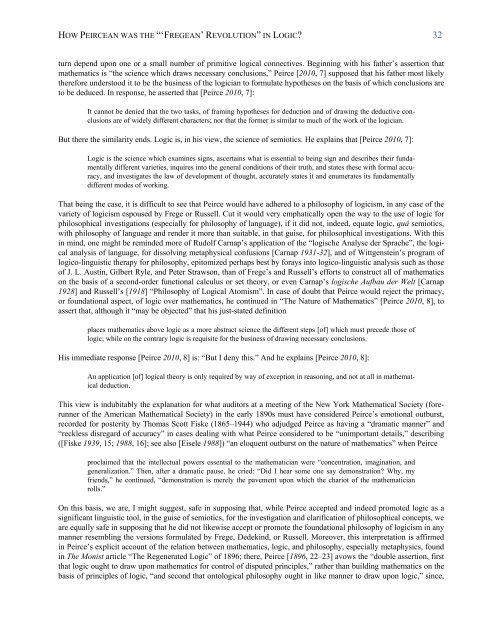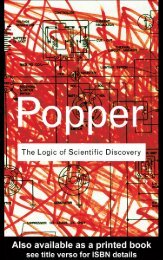Create successful ePaper yourself
Turn your PDF publications into a flip-book with our unique Google optimized e-Paper software.
HOW PEIRCEAN WAS THE “‘FREGEAN’ REVOLUTION” IN LOGIC? 32<br />
turn depend upon one or a small number of primitive logical connectives. Beginning with his father’s assertion that<br />
mathematics is “the science which draws necessary conclusions,” Peirce [2010, 7] supposed that his father most likely<br />
therefore understood it to be the business of the logician to formulate hypotheses on the basis of which conclusions are<br />
to be deduced. In response, he asserted that [Peirce 2010, 7]:<br />
It cannot be denied that the two tasks, of framing hypotheses for deduction and of drawing the deductive conclusions<br />
are of widely different characters; nor that the former is similar to much of the work of the logician.<br />
But there the similarity ends. Logic is, in his view, the science of semiotics. He explains that [Peirce 2010, 7]:<br />
Logic is the science which examines signs, ascertains what is essential to being sign and describes their fundamentally<br />
different varieties, inquires into the general conditions of their truth, and states these with formal accuracy,<br />
and investigates the law of development of thought, accurately states it and enumerates its fundamentally<br />
different modes of working.<br />
That being the case, it is difficult to see that Peirce would have adhered to a philosophy of logicism, in any case of the<br />
variety of logicism espoused by Frege or Russell. Cut it would very emphatically open the way to the use of logic for<br />
philosophical investigations (especially for philosophy of language), if it did not, indeed, equate logic, quâ semiotics,<br />
with philosophy of language and render it more than suitable, in that guise, for philosophical investigations. With this<br />
in mind, one might be reminded more of Rudolf Carnap’s application of the “logische Analyse der Sprache”, the logical<br />
analysis of language, for dissolving metaphysical confusions [Carnap 1931-32], and of Wittgenstein’s program of<br />
logico-linguistic therapy for philosophy, epitomized perhaps best by forays into logico-linguistic analysis such as those<br />
of J. L. Austin, Gilbert Ryle, and Peter Strawson, than of Frege’s and Russell’s efforts to construct all of mathematics<br />
on the basis of a second-order functional calculus or set theory, or even Carnap’s logische Aufbau der Welt [Carnap<br />
1928] and Russell’s [1918] “Philosophy of Logical Atomism”. In case of doubt that Peirce would reject the primacy,<br />
or foundational aspect, of logic over mathematics, he continued in “The Nature of Mathematics” [Peirce 2010, 8], to<br />
assert that, although it “may be objected” that his just-stated definition<br />
places mathematics above logic as a more abstract science the different steps [of] which must precede those of<br />
logic; while on the contrary logic is requisite for the business of drawing necessary conclusions.<br />
His immediate response [Peirce 2010, 8] is: “But I deny this.” And he explains [Peirce 2010, 8]:<br />
An application [of] logical theory is only required by way of exception in reasoning, and not at all in mathematical<br />
deduction.<br />
This view is indubitably the explanation for what auditors at a meeting of the New York Mathematical Society (forerunner<br />
of the American Mathematical Society) in the early 1890s must have considered Peirce’s emotional outburst,<br />
recorded for posterity by Thomas Scott Fiske (1865–1944) who adjudged Peirce as having a “dramatic manner” and<br />
“reckless disregard of accuracy” in cases dealing with what Peirce considered to be “unimportant details,” describing<br />
([Fiske 1939, 15; 1988, 16]; see also [Eisele 1988]) “an eloquent outburst on the nature of mathematics” when Peirce<br />
proclaimed that the intellectual powers essential to the mathematician were “concentration, imagination, and<br />
generalization.” Then, after a dramatic pause, he cried: “Did I hear some one say demonstration? Why, my<br />
friends,” he continued, “demonstration is merely the pavement upon which the chariot of the mathematician<br />
rolls.”<br />
On this basis, we are, I might suggest, safe in supposing that, while Peirce accepted and indeed promoted logic as a<br />
significant linguistic tool, in the guise of semiotics, for the investigation and clarification of philosophical concepts, we<br />
are equally safe in supposing that he did not likewise accept or promote the foundational philosophy of logicism in any<br />
manner resembling the versions formulated by Frege, Dedekind, or Russell. Moreover, this interpretation is affirmed<br />
in Peirce’s explicit account of the relation between mathematics, logic, and philosophy, especially metaphysics, found<br />
in The Monist article “The Regenerated Logic” of 1896; there, Peirce [1896, 22–23] avows the “double assertion, first<br />
that logic ought to draw upon mathematics for control of disputed principles,” rather than building mathematics on the<br />
basis of principles of logic, “and second that ontological philosophy ought in like manner to draw upon logic,” since,





